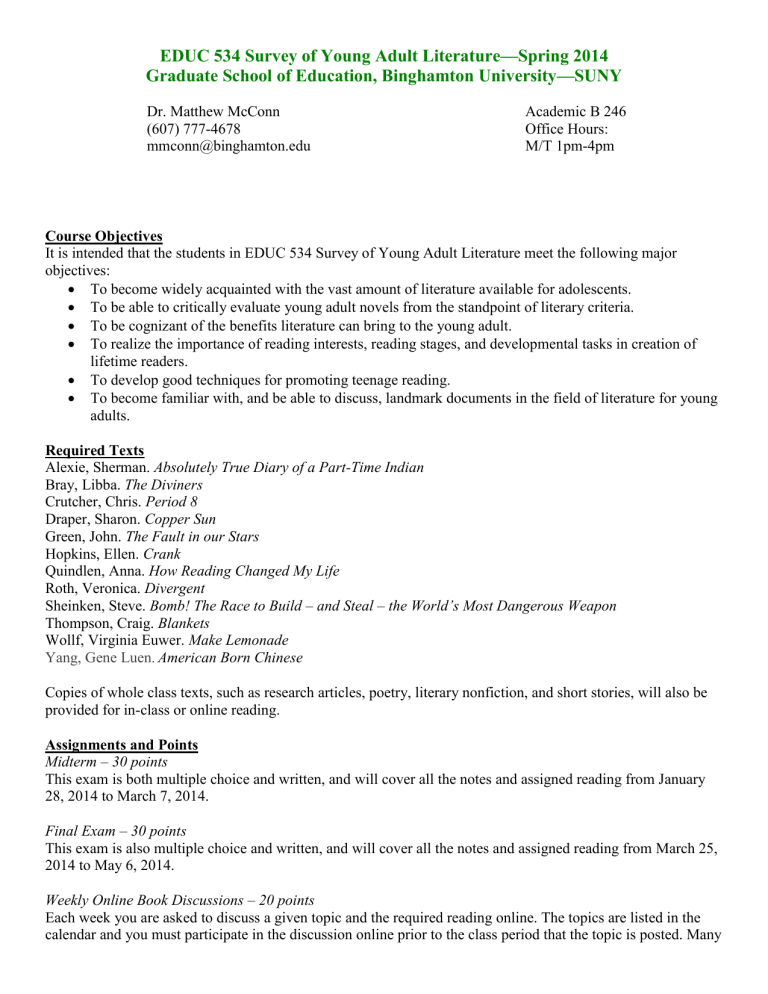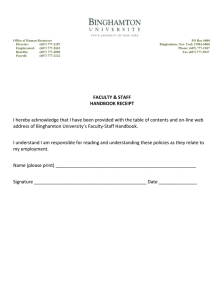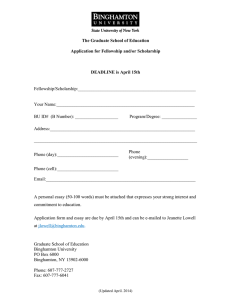EDUC 534

EDUC 534 Survey of Young Adult Literature—Spring 2014
Graduate School of Education, Binghamton University—SUNY
Dr. Matthew McConn
(607) 777-4678 mmconn@binghamton.edu
Academic B 246
Office Hours:
M/T 1pm-4pm
Course Objectives
It is intended that the students in EDUC 534 Survey of Young Adult Literature meet the following major objectives:
To become widely acquainted with the vast amount of literature available for adolescents.
To be able to critically evaluate young adult novels from the standpoint of literary criteria.
To be cognizant of the benefits literature can bring to the young adult.
To realize the importance of reading interests, reading stages, and developmental tasks in creation of lifetime readers.
To develop good techniques for promoting teenage reading.
To become familiar with, and be able to discuss, landmark documents in the field of literature for young adults.
Required Texts
Alexie, Sherman. Absolutely True Diary of a Part-Time Indian
Bray, Libba. The Diviners
Crutcher, Chris. Period 8
Draper, Sharon. Copper Sun
Green, John. The Fault in our Stars
Hopkins, Ellen. Crank
Quindlen, Anna. How Reading Changed My Life
Roth, Veronica. Divergent
Sheinken, Steve. Bomb! The Race to Build – and Steal – the World’s Most Dangerous Weapon
Thompson, Craig. Blankets
Wollf, Virginia Euwer. Make Lemonade
Yang, Gene Luen . American Born Chinese
Copies of whole class texts, such as research articles, poetry, literary nonfiction, and short stories, will also be provided for in-class or online reading.
Assignments and Points
Midterm – 30 points
This exam is both multiple choice and written, and will cover all the notes and assigned reading from January
28, 2014 to March 7, 2014.
Final Exam – 30 points
This exam is also multiple choice and written, and will cover all the notes and assigned reading from March 25,
2014 to May 6, 2014.
Weekly Online Book Discussions – 20 points
Each week you are asked to discuss a given topic and the required reading online. The topics are listed in the calendar and you must participate in the discussion online prior to the class period that the topic is posted. Many
times, though, discussions online simply don’t have the same impact as a class discussion. Therefore, I will always start the classes by opening up with a discussion about the readings and the topics. I expect the same courtesy to be shown to one another online as I do in the classroom.
Reading Autobiography – 10 points
This is a personal essay about how your reading habits developed. Talk about your memories, good and bad, about how you came to read and what you read at different times in your life. What were your earliest memories of books and your reaction to them? When and where did you read? Did certain teachers, librarians, friends, parents, or siblings influence you? How did you react to assigned reading along the way? Book reports?
Memorizing poetry? Try to trace your own development as a reader from your earliest memories to today.
Class Attendance and Participation – 10 points
This class simply cannot work unless you are contributing, which means you must be here. And be here on time.
The class notes make up 50% of the exams, so you need to be sure that you are present and attentive. You are allowed two class absences (not online discussions), so if you miss a class, then you’ll need to get the notes from another student.
Grades
Based on a 100 point scale, grades will be assigned on the following basis: A 94-100, A- 90-93, B+ 87-89, B
84-86, B- 80-83, C+ 77-79, C 74-76, C- 70-73, D+ 67-69, D 64-66, D- 60-63, F 59 or lower.
PLEASE NOTE: All assignments must be typed and will not be accepted late.
Only extreme emergencies with documentation will be considered as a legitimate basis for accepting a late assignment. After three absences, you will be dropped from the course.
Classroom Environment
I have one rule: Respect others and their opinions. (And respecting others includes being on time and staying off your phone.) Binghamton University is committed to creating a safe environment that fosters intellectual conversations and the sharing of all ideas. As a Binghamton University student, please be mindful of this commitment. This extends to online work as well.
Student Accommodations Under the Americans with Disabilities Act
We will provide reasonable academic accommodations to students who request and require them. Please contact the Office of Services for Students with Disabilities (SSD) at 607.777.2686 in UU-119. The SSD office recommends necessary and appropriate accommodations according to your specifically diagnosed disability.
Information regarding your disability is strictly confidential.
Academic Dishonesty
If you are engaging in conduct that you know or should know is not permitted by the university or your course instructor to fulfill academic requirements, then there will be consequences. Students are expected to do original work and avoid plagiarism through strict adherence to APA format. Penalties include failure of the entire assignment and referral to the department chair for consideration of additional action. The annual university
Student Handbook publication has detailed information on academic integrity: http://www2.binghamton.edu/student-handbook/ If you’re not sure whether it is plagiarism or not, then just ask me.
Tentative Calendar
January 28
Review Syllabus and Requirements
Reading Autobiography due 2/11
What is Young Adult Literature?
February 4
Why use YA literature?
Adolescent Developmental Tasks
Journal Article Discussion
Due: Online discussion of why do you think YA literature should or should not be used in the classroom? and How Reading Changed My Life, by Anna Quindlen.
February 11
What is sub-literature?
The History of Series Books
Due: Reading Autobiography
February 18
The Stratemeyer Literary Syndicate
The History of Comic Books
Due: Online discussion of American Born Chinese , by Gene Luen Yang and Blankets , by Craig
Thomspon.
February 25
Female Characters in YA literature
Female Rites of Passage in YA literature
Due: Online discussion of The Fault in Our Stars, by John Green
March 4
Male Characters in YA Literature
Young Adult Literature in the Romantic Mode
Due: Online Discussion of Period 8, by Chris Crutcher
March 11
The Best Seller – The Bridge Between Teen fiction and adult reading
Censorship
Due: Online discussion of Absolutely True Diary of a Part-Time Indian, by Sherman Alexie
March 18
Midterm Exam
March 25
Adolescents and Poetry interests
Due: Online discussion of Make Lemonade , by Virginia Wollf and Crank, by Ellen Hopkins
April 1
The Nonfiction Interests of Teenagers
Due: Online discussion of Bomb! The Race to Build – and Steal – the World’s Most Dangerous
Weapon, by Steve Sheinken.
April 8
Historical Fiction Aimed at Teenagers
The Adolescent Need to Find a Quiet Hero
Due: Online discussion of Copper Sun , by Sharon Draper
April 15 – No Class
April 22
Mystery, Fantasy, and Sci-Fi
Books for Special Populations
Due: Online discussion of The Diviners , by Libba Bray and Divergent , by Veronica Roth
April 29
Updates in YA Literature and Author Accessibility
Free Reading and Individualized Reading – Landmark Studies
Due: Online discussion – Reach out to an author (social media) and discuss your experience.
May 6
Free Reading and Individualized Reading – Landmark Studies (cont.)
What does free reading and individualized reading look like in the classroom?
Due: Online discussion on which book is your favorite and why?
May 13 – Finals Week
Final Exam


